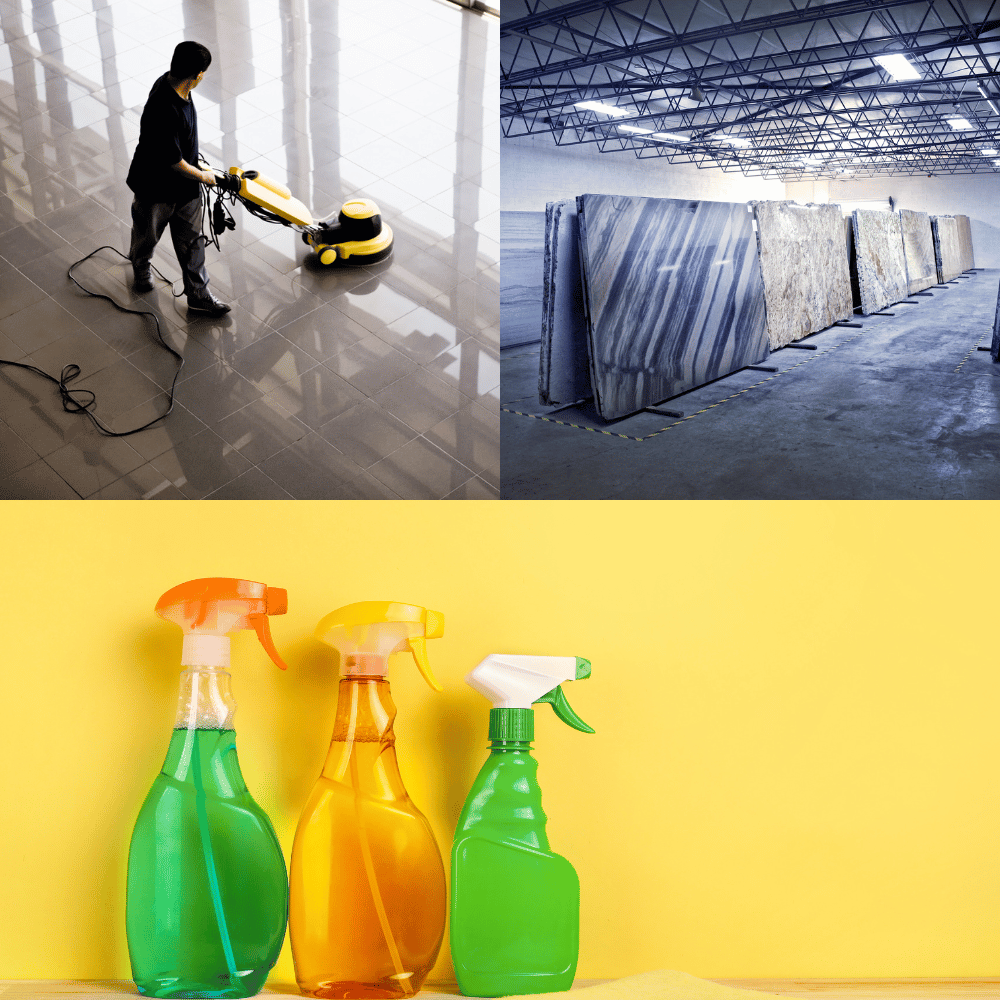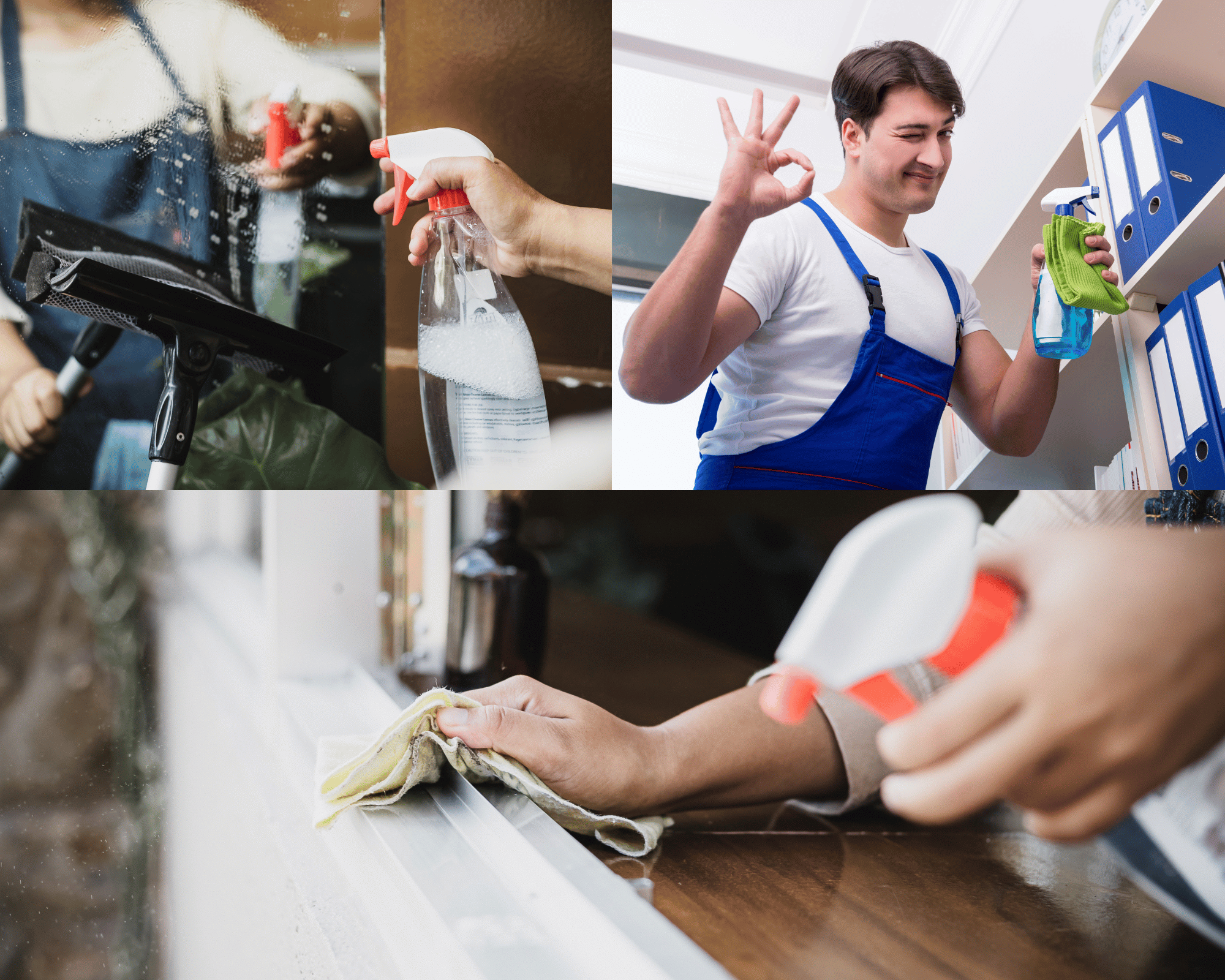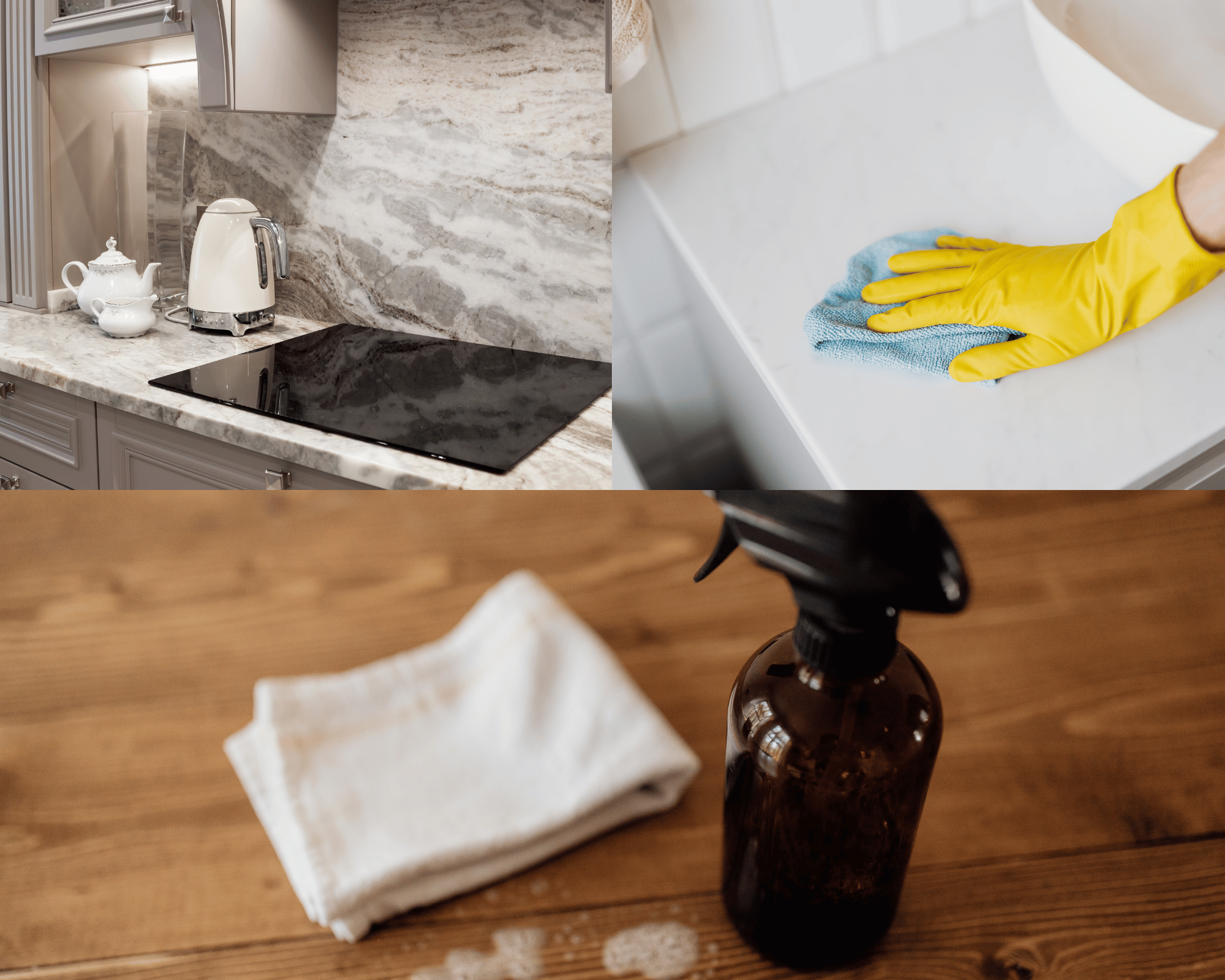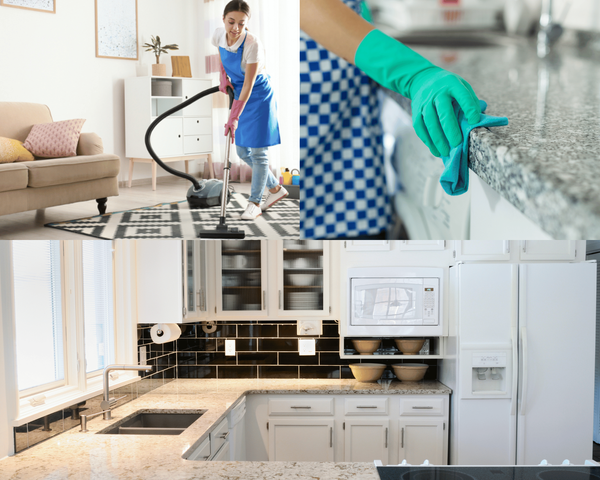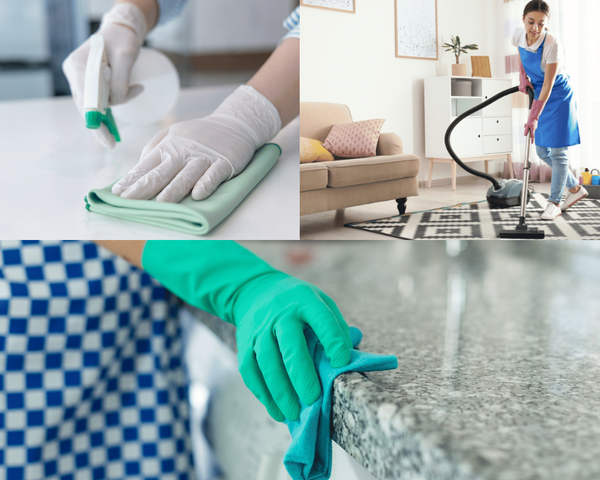Quartz countertops are the crown jewels of modern kitchens, gleaming with elegance and durability. New quartz countertops offer a sleek finish and low-maintenance appeal, making them ideal for kitchen and bathroom applications. However, maintaining quartz countertops in pristine condition requires more than just a quick wipe-down. Many homeowners are turning to DIY quartz cleaner recipes to keep their surfaces sparkling without the harsh chemicals found in commercial products. In this article, we’ll explore some effective homemade quartz cleaning solutions, ensuring your countertops remain the envy of your neighborhood.
Key Takeaways:
- DIY quartz cleaner recipes are cost-effective and environmentally friendly.
- Homemade quartz cleaning solutions can be just as effective as store-bought options.
- Safety is paramount; ensure your DIY solutions are safe for quartz surfaces.
Understanding Quartz Countertops
Quartz countertops are engineered stone surfaces made from a blend of natural quartz crystals and resins. This combination results in a non-porous, stain-resistant surface that is both beautiful and functional. However, despite their resilience, quartz countertops can still suffer from scratches, stains, and dullness if not properly cared for.
The key to maintaining kitchen countertops made of quartz is regular cleaning with solutions that won’t damage the surface. Many commercial cleaners contain harsh chemicals that can strip the resin and dull the finish over time. This is where DIY quartz cleaner recipes come into play, offering a gentle yet effective alternative. One effective way to clean quartz is by using a mixture of water and liquid dish soap, which avoids the use of harsh chemicals.
Cleaning Quartz Countertops: What to Avoid
When it comes to cleaning quartz countertops, knowing what to avoid is just as important as knowing what to do. Here are some common mistakes to steer clear of to keep your quartz surfaces in top condition:
- Harsh Chemicals: Avoid using bleach, ammonia, or any other harsh chemicals. These can damage the resin that binds the quartz crystals, leading to discoloration and a dull finish.
- Abrasive Cleaners: Steer clear of abrasive cleaners and scrubbers. These can scratch the surface of your quartz countertops, creating unsightly dull spots.
- Hot Pans and Objects: Never place hot pans or objects directly on your quartz countertop. The sudden change in temperature can cause thermal shock, leading to cracks or other damage.
- Frozen Items: Similarly, placing frozen items directly on the countertop can cause cracking or warping due to the extreme temperature difference.
- Household Cleaners with Abrasive Particles: Many household cleaners contain abrasive particles or harsh chemicals that can damage the quartz surface. Always check the ingredients before using any cleaner on your quartz countertops.
By avoiding these common pitfalls, you can ensure your quartz countertops remain beautiful and functional for years to come.
DIY Quartz Cleaner Recipes
Creating your own quartz cleaner at home is not only economical but also allows you to control the ingredients, ensuring they are safe for your countertops. One popular recipe involves mixing equal parts of water and isopropyl alcohol in a spray bottle. Add a few drops of dish soap and shake well. This solution is excellent for everyday cleaning, cutting through grease and grime without leaving streaks.
Another effective homemade quartz cleaning solution is a mixture of vinegar and water. However, it’s crucial to use this sparingly, as vinegar is acidic and can damage the resin if used excessively. For a safer alternative, consider using a natural cleaning solution like a mixture of baking soda and water to form a paste. This can be applied to stubborn stains and gently scrubbed with a soft cloth.
Is DIY Quartz Cleaner Safe to Disinfect Quartz Countertops?
Safety is a top concern when using any cleaning product on your quartz countertops. The good news is that most DIY quartz cleaner recipes are safe when used correctly. The key is to avoid abrasive materials and harsh chemicals that can scratch or dull the surface. Always test your homemade solution on a small, inconspicuous area before applying it to the entire countertop.
Using DIY solutions to disinfect quartz countertops is crucial to eliminate germs, bacteria, and viruses, including COVID-19.
It’s also important to remember that less is more. Over-cleaning or using too much solution can lead to residue build-up, which can attract dirt and grime. Stick to a regular cleaning schedule and use your DIY solutions sparingly to keep your countertops looking their best.
Disinfecting Quartz Countertops
Keeping your quartz countertops clean is essential, but disinfecting them is crucial for maintaining a hygienic kitchen environment. Here’s a simple and effective method to disinfect your quartz countertops:
- Prepare the Solution: Mix 1 cup of warm water with 1 tablespoon of mild dish soap and 1 tablespoon of rubbing alcohol in a spray bottle.
- Apply the Solution: Spray the solution generously onto the countertop surface.
- Let It Sit: Allow the solution to sit for 5-10 minutes. This gives the disinfectant time to work its magic and kill any bacteria or germs.
- Wipe Down: Use a soft cloth to wipe down the countertop, paying special attention to areas with visible stains or spills.
- Rinse and Repeat: Rinse the cloth thoroughly and wipe down the countertop again to remove any soap residue.
This method ensures your quartz countertops are not only clean but also free from harmful bacteria, making your kitchen a safer place.
Practical Tips for Cleaning Quartz Countertops
When cleaning quartz counters, it’s essential to use the right tools and techniques. A soft microfiber cloth is ideal for wiping down surfaces, as it won’t scratch or leave lint behind. For tougher stains, a non-abrasive sponge can be used in conjunction with your homemade quartz cleaning solution.
Avoid using steel wool, scouring pads, or any other abrasive materials, as these can damage the surface. Additionally, steer clear of bleach, ammonia, and other harsh chemicals that can strip the resin and dull the finish. Instead, opt for gentle, natural ingredients that are safe for quartz.
Protecting Your Quartz Countertop
Protecting your quartz countertop from damage and stains is key to maintaining its pristine appearance and longevity. Here are some practical tips to help you safeguard your quartz surfaces:
- Use a Cutting Board: Always use a cutting board when preparing food. This prevents scratches and stains from knives and other sharp objects.
- Place Trivets or Mats: Use trivets or mats under hot pans and objects to prevent thermal shock and potential damage to the quartz.
- Use Coasters and Placemats: Place coasters or placemats under glasses and cups to prevent water spots and stains.
- Avoid Heavy Objects: Refrain from placing heavy objects directly on the countertop, as they can cause damage and scratches.
- Regular Cleaning: Regularly clean and maintain your quartz countertop to prevent stains and damage. A consistent cleaning routine helps keep your quartz surfaces looking their best.
By following these tips, you can protect your quartz countertops and ensure they remain a stunning focal point in your kitchen.
Removing Stains from Quartz Countertops
Stains on quartz countertops can be a challenge, but with the right approach, they can be effectively removed. Here are some methods to tackle common stains:
- Food and Drink Stains: Mix equal parts water and white vinegar in a spray bottle. Spray the solution onto the stain and let it sit for 10-15 minutes. Wipe clean with a soft cloth.
- Oil-Based Stains: Mix 1 tablespoon of baking soda with 2 tablespoons of water to form a paste. Apply the paste to the stain and let it sit for 30 minutes. Wipe clean with a soft cloth.
- Tough Stains: For tougher stains, use a gentle cleaning product specifically designed for quartz countertops. Follow the manufacturer’s instructions and always test the product on a small, inconspicuous area first.
These methods can help you keep your quartz countertops free from stains, ensuring they remain as beautiful as the day they were installed.
The Benefits of Proper Quartz Countertop Care
Proper care and maintenance of your quartz countertops offer numerous benefits, ensuring they remain a valuable addition to your home. Here are some advantages of regular quartz countertop care:
- Maintains Appearance: Regular cleaning and maintenance help maintain the appearance of your quartz countertop, keeping it looking like new for years to come.
- Prevents Damage: Proper care prevents damage from scratches, stains, and thermal shock, ensuring your quartz countertop remains in good condition.
- Increases Longevity: Regular maintenance and care can increase the longevity of your quartz countertop, making it last for decades.
- Easy to Clean: Quartz countertops are easy to clean and maintain, making them a low-maintenance option for busy homeowners.
- Hygienic: Proper care and maintenance ensure a hygienic kitchen environment, reducing the risk of bacterial growth and contamination.
By investing a little time and effort into maintaining your quartz countertops, you can enjoy their beauty and functionality for many years to come.
Summary
Maintaining the beauty and functionality of your quartz countertops doesn't have to be a chore. With the right DIY quartz cleaner recipes and a little elbow grease, you can keep your surfaces looking as good as new. Homemade quartz cleaning solutions offer a safe, effective, and environmentally friendly alternative to commercial products, ensuring your countertops remain a stunning focal point in your home.
FAQ
Q1: Can I use vinegar on quartz countertops?
A1: While vinegar can be used in small amounts, it's best to use it sparingly. Vinegar is acidic and can damage the resin in quartz if used excessively. Opt for a mixture of baking soda and water for a safer alternative.
Q2: How often should I clean my quartz countertops?
A2: It's recommended to clean your quartz countertops daily with a gentle solution to prevent dirt and grime build-up. For tougher stains, use a DIY quartz cleaner recipe as needed.
Q3: Are DIY quartz cleaner recipes effective against bacteria?
A3: Yes, many DIY solutions, such as those containing isopropyl alcohol, are effective at killing bacteria. However, for thorough disinfection, consider using a commercial disinfectant specifically designed for quartz surfaces.
